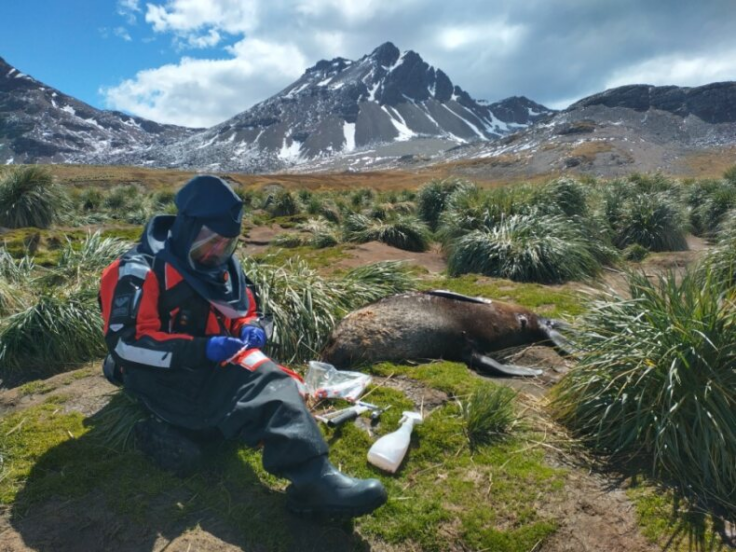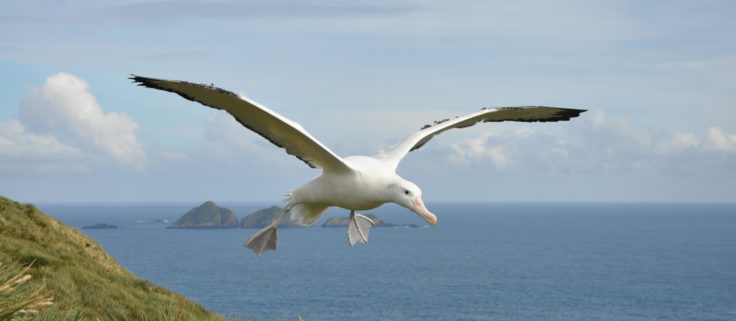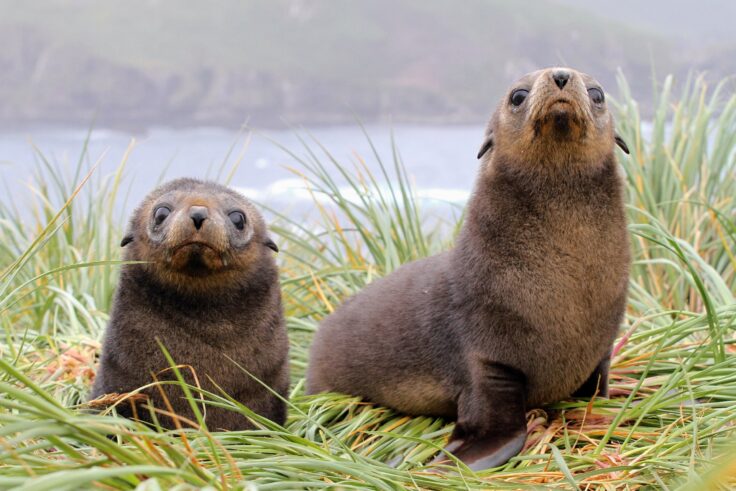Avian flu continues to affect wildlife on South Georgia
SOUTH GEORGIA Update, January 2024 – Testing for Highly Pathogenic Avian Influenza (HPAI) continues on the subantarctic island of South Georgia since it was detected in October 2023. The latest results from samples taken from the islands reveal that the disease has now been detected in elephant and fur seals.
Avian Influenza was first detected in the brown skua populations, closely followed by kelp gulls. The team at the British Antarctic Survey (BAS), at Cambridge and on the islands, are working closely with the Government of South Georgia and South Sandwich Islands (GSGSSI) who govern the territory.
Recent samples were collected by a vet from the Animal and Plant Health Agency (APHA) and tested at their laboratories in Weybridge. The results are from samples collected from 14 different animals. They show positive results for HPAI H5N1 in elephant seals, fur seals, brown skuas, kelp gulls and Antarctic terns. Samples from the albatross and giant petrel colonies on Bird Island tested negative. There have been no reports of above average mortality in any penguin species to date.

Sequence analysis from infected birds demonstrates that the virus has most likely been introduced through migratory bird movement from South America. Further analysis is ongoing to determine the source of infection for the seal species. BAS and GSGSSI, guided by the GSGSSI response plan, continue to carefully monitor the situation across the territory.
BAS operates two research stations on South Georgia: King Edward Point and Bird Island. As a result of the confirmed cases of HPAI, most fieldwork involving contact with animals has been suspended. BAS staff are following the additional biosecurity measures adopted this season of enhanced cleaning of clothing and field equipment when moving between sites with high densities of wildlife, as well as remaining vigilant for signs of disease.
Ash Bennison is the science manager for Bird Island Research Station. He says:
“It’s incredibly sad to witness the effects of avian flu on the animal populations we study on South Georgia. We are doing everything we can to mitigate the effects of this disease and are working closely with GSGSSI to continue our work to monitor and conserve these amazing species.”
Key elements of the wider science programme at King Edward Point and Bird Island continue under caution, including long-term monitoring of wandering albatross, black-browed albatross, grey-headed albatross, northern and southern giant petrels, gentoo penguins and macaroni penguins.
South Georgia has some of the most closely monitored seabird colonies in the world, equipping scientists and conservationists with indicators of change for species.

BAS and GSGSSI are working closely with APHA to monitor and control the spread of the disease and to mitigate its impact on the region’s wildlife.
Laura Sinclair Willis, Chief Executive, Government of South Georgia & the South Sandwich Islands, says:
“The Government of South Georgia and the South Sandwich Islands anticipated that High Pathogenicity Avian Influenza would likely arrive on our shores in the 23/24 austral summer, and we are grateful for the ongoing support of the Animal and Plant Health Agency, British Antarctic Survey, Ministry of Defence and the Antarctic cruise industry, along with a global community of partners and stakeholders who are helping us to monitor the impacts within the Territory.
“The transmission and spread of this disease is primarily a natural phenomenon, and we continue to emphasise the importance of scrupulous biosecurity by all those entering South Georgia and the South Sandwich Islands.”

Professor Ian Brown, APHA’s Director of Scientific Services, said:
“Given Antarctica is such a unique and special biodiversity hotspot it is sad and concerning to see the disease spread to mammals in the region. If avian influenza continues to spread throughout the sub-Antarctic region this could significantly threaten the fragile ecosystem, and potentially put a number of very large populations of seabirds and sea mammals at risk.
“However, the available genomic surveillance data continues to suggest no widespread mammalian adaptation of the virus and the knowledge gathered from these latest samples will be shared rapidly with international partners to aid their efforts to tackle the disease and inform global risk mitigation. Uncertainties remain as to how the virus is infecting and spreading amongst these populations. APHA will continue to work with the Government of South Georgia and South Sandwich Islands, the Falkland Islands and the British Antarctic Survey to monitor the impact of the wildlife on South Georgia, and the potential spread to other areas.”
APHA Weybridge provides impartial, high quality scientific expertise and policy development. Work on animal diseases has been conducted at the APHA Weybridge site for over 100 years and the International Reference Laboratory for influenza and Newcastle disease holds one of the largest viral repositories globally, with our oldest isolates dating back to 1940s.